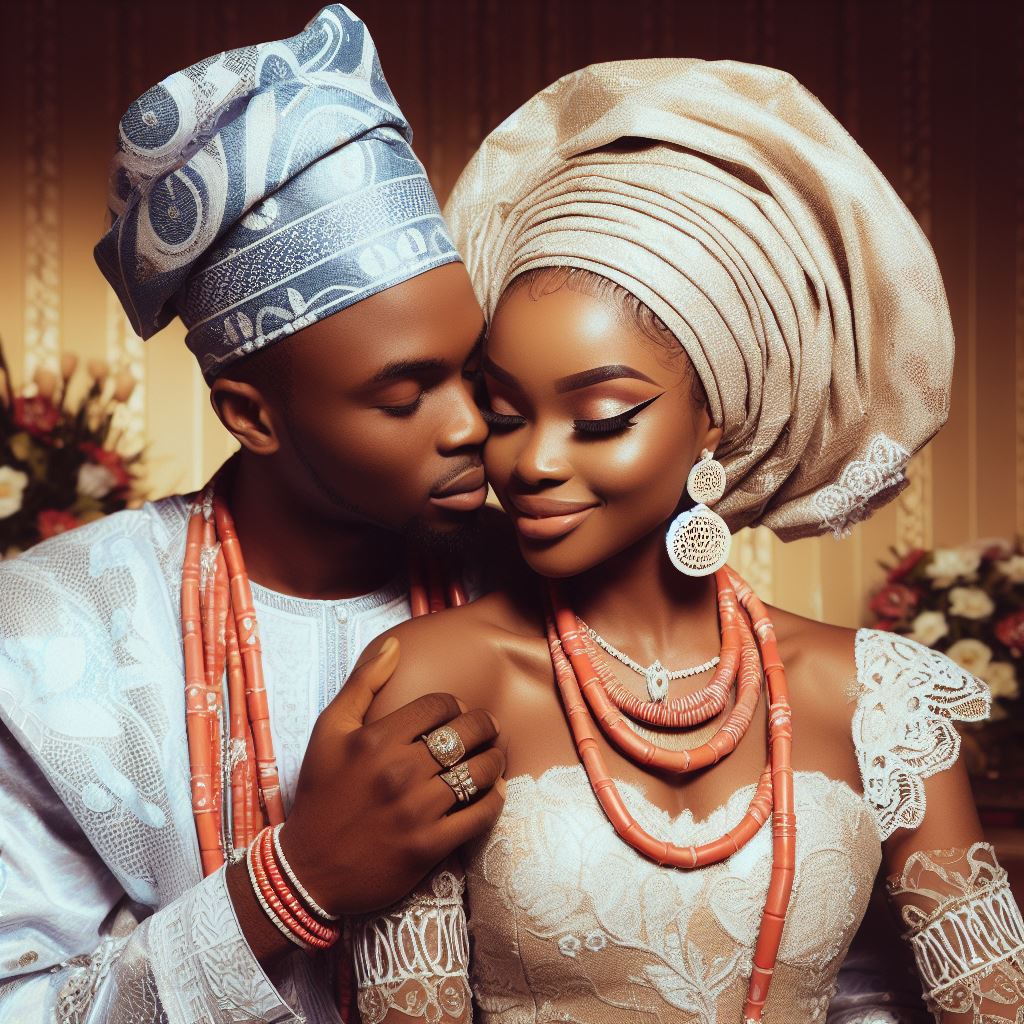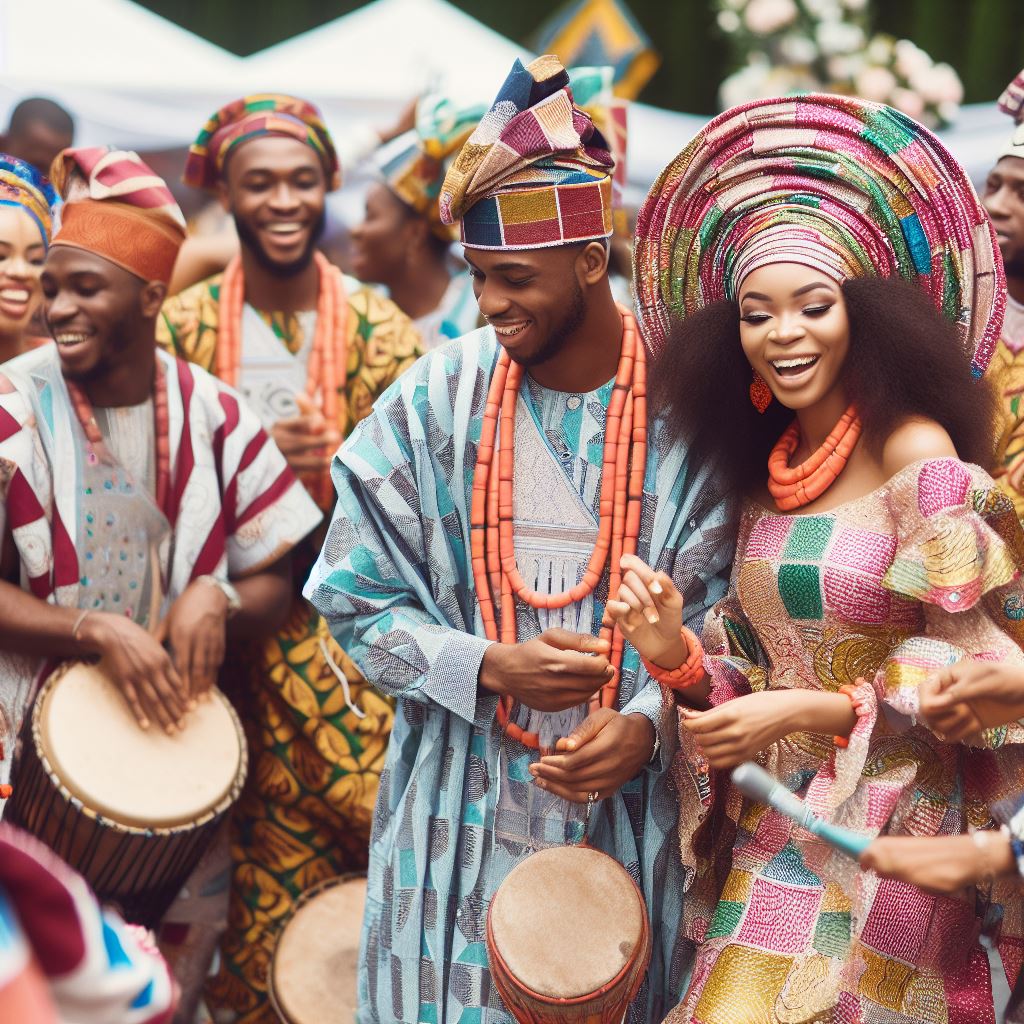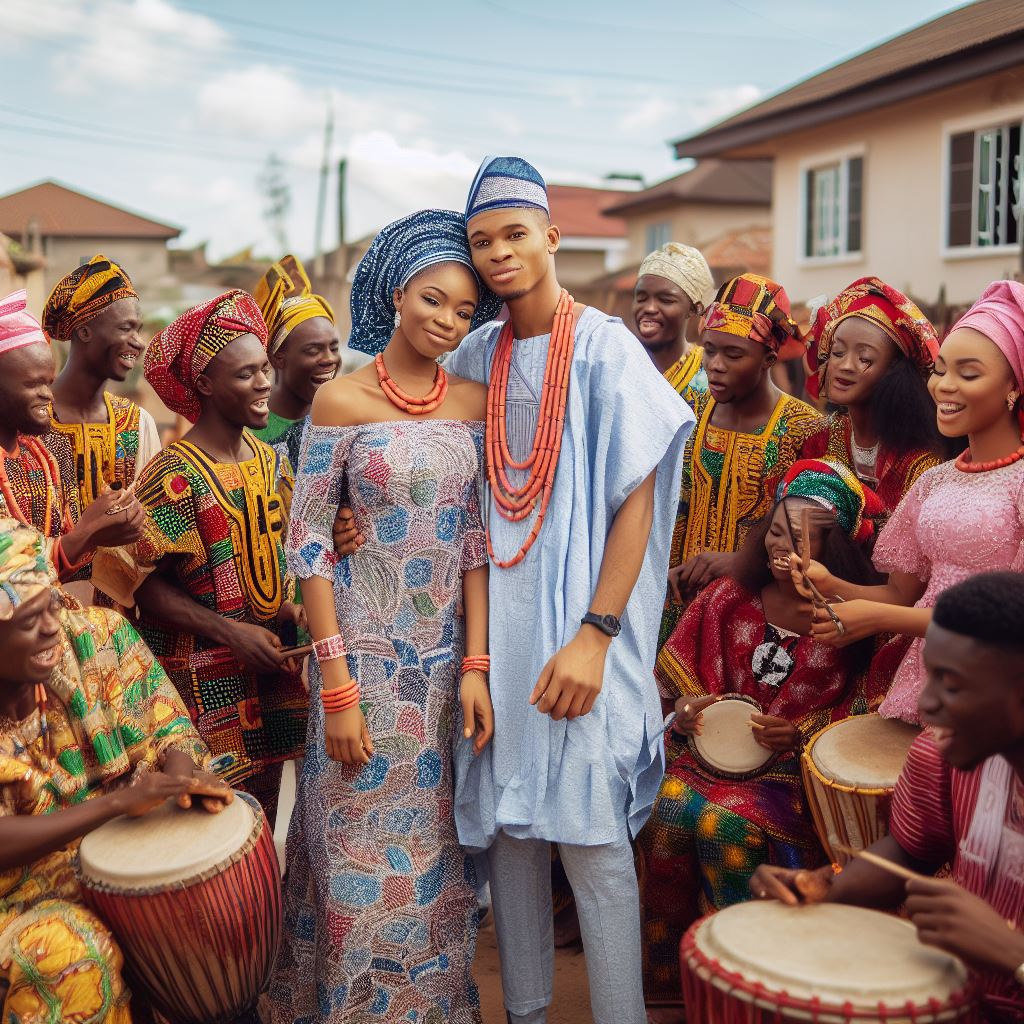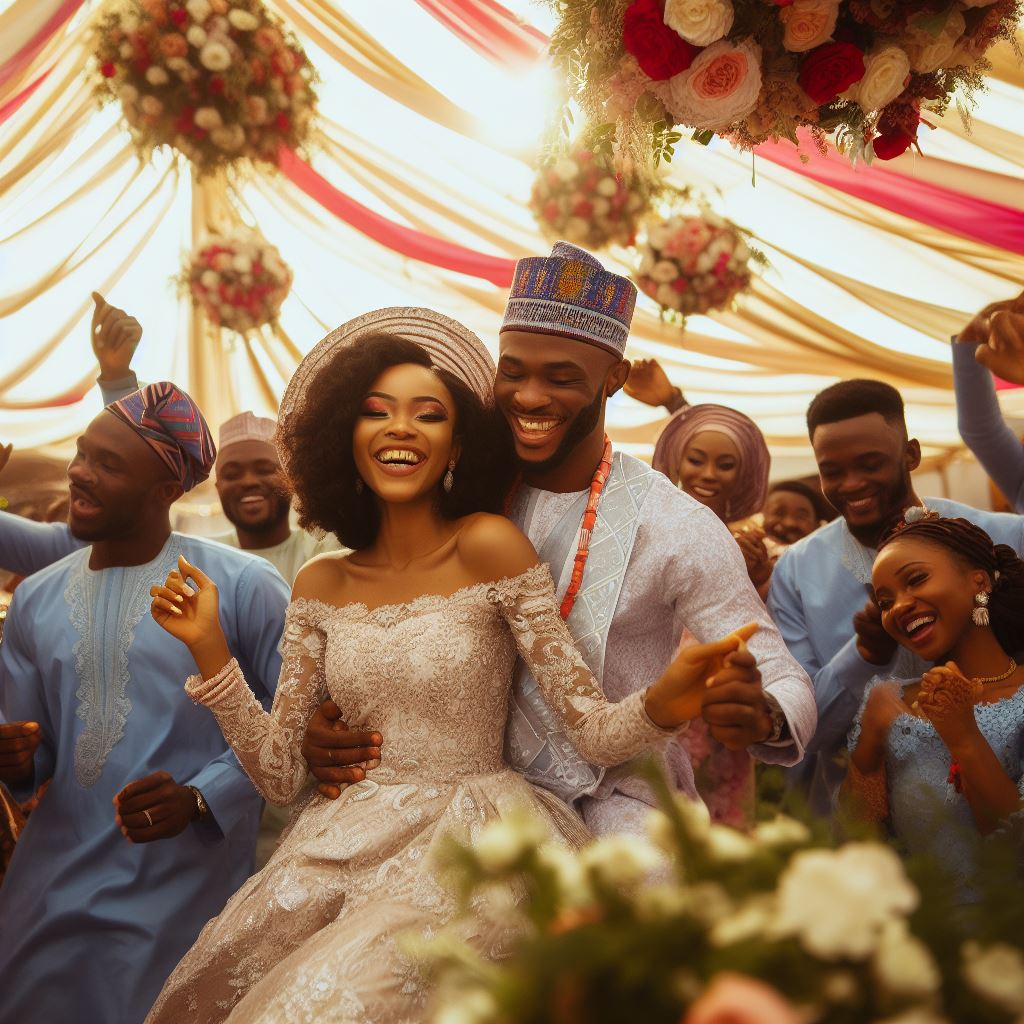Introduction
Marriage in Nigeria is more than a word or ceremony. It is the union of two people that is highly valued in Nigerian culture.
This blog post aims to explore the definition of marriage, its significance in Nigerian culture, and the purpose of this discussion.
Marriage, simply put, is the legal and social union between two individuals, typically recognized by law and often involving a ceremony.
But in Nigerian culture, marriage holds a much deeper meaning.
In Nigeria, marriage is seen as a sacred institution that not only brings two individuals together but also unites families and communities.
It is a significant event that marks the beginning of a new phase in life, symbolizing love, commitment, and stability.
The importance of marriage in Nigerian culture cannot be overstated. It serves as a foundation for the family structure and the continuation of traditions and values.
It is believed that through marriage, couples contribute to the growth and preservation of their communities.
This blog post aims to shed light on the various aspects of marriage in Nigeria, including the traditional customs and rituals, the role of families, and the expectations placed on married individuals.
It will also explore the challenges faced by couples in modern times and how they navigate the complexities of marriage within a changing society.
Basically, marriage in Nigeria encompasses more than just a word or ceremony.
It is an integral part of the culture, holding deep significance for individuals and communities.
This blog post will delve into the intricacies of marriage in Nigeria, aiming to provide insight and understanding on this important aspect of Nigerian life.
Traditional Nigerian Marriage Customs
Pre-marital rites
- Introduction between families: The families of the bride and groom meet to discuss the marriage proposal.
- Bride price negotiation: The groom and his family negotiate the bride price with the bride’s family.
- Engagement ceremony: A formal ceremony is held to announce the engagement of the couple.
Wedding ceremony
- Traditional wedding attire: The bride and groom dress in traditional Nigerian outfits, representing their cultural heritage.
- Important cultural rituals and traditions: Various customs are performed during the wedding ceremony, such as the exchange of gifts and the pouring of libations.
- Role of family and community: The family and community play a significant role in the wedding, offering support and guidance to the couple.
- Wedding feast and celebrations: After the ceremony, a grand feast is held where family and friends come together to celebrate the union.
In Nigeria, marriage is not just a word or a ceremony, but a rich cultural experience that encompasses various customs and traditions.
These customs reflect the importance of family and community in Nigerian society.
Pre-marital rites
1. Introduction between families
The pre-marital rites are an essential part of the marriage process.
They begin with the introduction between the families of the bride and groom.
This meeting allows the families to get to know each other, exchange pleasantries, and discuss the marriage proposal.
It is also an opportunity to ensure compatibility and compatibility between the families.
2. Bride price negotiation
Once the families agree on the marriage, the bride price negotiation takes place.
The groom and his family meet with the bride’s family to determine the bride price, which is a symbolic gesture of appreciation and respect.
This negotiation involves discussions on the amount, payment terms, and other considerations.
3. Engagement ceremony
After the bride price negotiation, the engagement ceremony is held to officially announce the engagement of the couple.
It is a formal event attended by family and close friends.
During this ceremony, the groom presents gifts to the bride’s family, symbolizing his commitment and appreciation.
The engagement ceremony serves as a public declaration of the couple’s intent to marry.
Wedding ceremony
1. Traditional wedding attire
The wedding ceremony itself is a grand affair filled with colorful traditions and rituals. One of the highlights is the traditional wedding attire.
The bride and groom dress in vibrant outfits that represent their cultural heritage.
The attire is often elaborate, showcasing the richness of Nigerian traditions and aesthetics.
2. Important cultural rituals and traditions
Throughout the wedding ceremony, various cultural rituals and traditions are performed.
These rituals symbolize the couple’s transition into married life and the joining of their families.
For example, the exchange of gifts symbolizes the bond between the families, while the pouring of libations pays tribute to ancestors and seeks their blessings for the couple’s union.
3. Role of family and community
The family and community play an integral role in Nigerian weddings.
They offer support, guidance, and blessings to the couple.
The elders provide wisdom and advice, ensuring a strong foundation for the newlyweds.
The community as a whole comes together to celebrate the union, demonstrating the collective joy and support for the couple’s journey into marriage.
Wedding feast and celebrations
After the wedding ceremony, a grand feast is held to celebrate the union.
Family and friends gather to enjoy a sumptuous meal and rejoice in the couple’s happiness.
The wedding feast is a time of merriment and celebration, filled with music, dancing, and joviality.
Generally, marriage in Nigeria goes beyond a mere word or ceremony. It is a cultural experience that encompasses pre-marital rites and a grand wedding ceremony.
These traditions not only bring families together but also celebrate the rich cultural heritage of Nigeria.
They highlight the importance of family, community, and collective joy in Nigerian society.
Read: God’s Plan for Marriage: Rooted in Biblical Scriptures
Legal Aspects of Marriage in Nigeria
Marriage Act
- There are various types of marriages recognized by Nigerian law.
- The marriage registration process involves submitting the necessary documents to the appropriate authorities.
- A valid marriage in Nigeria must meet certain legal requirements, such as consent and capacity.
Challenges and Controversies Surrounding Legal Aspects
- Polygamy is a longstanding practice in Nigeria, but its legality has been a subject of debate.
- Issues regarding underage marriage have raised concerns about the protection of children’s rights.
- The debate on same-sex marriage in Nigeria reflects differing societal and religious views.
Marriage Act
In Nigeria, the legal aspects of marriage are regulated by the Marriage Act.
This legislation recognizes various types of marriages, ensuring legal protection and benefits for couples.
Understanding the different aspects of the Marriage Act can provide insights into the Nigerian marriage system.
1. Types of marriages recognized by Nigerian law
Under the Marriage Act, there are several types of marriages recognized by law.
These include Christian marriages, Islamic marriages, civil marriages, customary marriages, and statutory marriages.
Each type of marriage has its specific requirements and procedures, ensuring compliance with legal regulations.
2. The marriage registration process
The registration process for marriages in Nigeria involves submitting the necessary documents to the appropriate authorities, such as the local government marriage registry.
Couples are required to provide identification, proof of age, consent forms, and other relevant documents.
This registration process ensures that the marriage is officially recognized by the government.
3. Legal requirements
For a marriage to be considered valid in Nigeria, it must meet certain legal requirements.
Consent and capacity are essential elements, ensuring that both parties willingly enter into the union and have the mental capacity to understand the commitment they are making.
In addition, a monogamous marriage mandates having only one spouse, except in customary marriages, which permit polygamy.
Challenges and Controversies Surrounding Legal Aspects
1. Polygamy is a longstanding practice in Nigeria, but its legality has been a subject of debate
Polygamy is a topic that has stirred controversy in Nigeria.
While it is a longstanding cultural practice in many Nigerian communities, there is an ongoing debate regarding its legality.
Some argue that polygamy goes against the principles of gender equality and women’s rights, while others believe it is a valid cultural and religious tradition.
The legal status of polygamy remains a contentious issue.
2. Issues regarding underage marriage have raised concerns about the protection of children’s rights
Another significant challenge surrounding the legal aspects of marriage in Nigeria is the issue of underage marriage.
Many cases involve young girls being forced into early marriages, often against their will.
These cases have stirred concerns over the infringement of children’s rights, harming underage girls physically, emotionally, and psychologically.
Efforts are being made to combat this issue and protect vulnerable individuals.
3. Debate on same-sex marriage in Nigeria reflects differing societal and religious views
A highly debated topic in Nigerian society is same-sex marriage.
Nigeria is known for its conservative stance, with many religious and cultural beliefs opposing homosexuality.
The debate on same-sex marriage revolves around societal acceptance, religious doctrine, and individual rights.
Currently, same-sex marriage is not legally recognized in Nigeria, and LGBTQ+ individuals face discrimination and marginalization.
Essentially, the legal aspects of marriage in Nigeria play a crucial role in defining the institution of marriage.
The Marriage Act recognizes various types of marriages and sets out registration processes and legal requirements.
However, challenges and controversies surround issues such as polygamy, underage marriage, and same-sex marriage.
Addressing these challenges requires a balance between cultural traditions, human rights, and legal protections for all individuals.
Read: The Role of Husbands & Wives: Exploring Ephesians 5
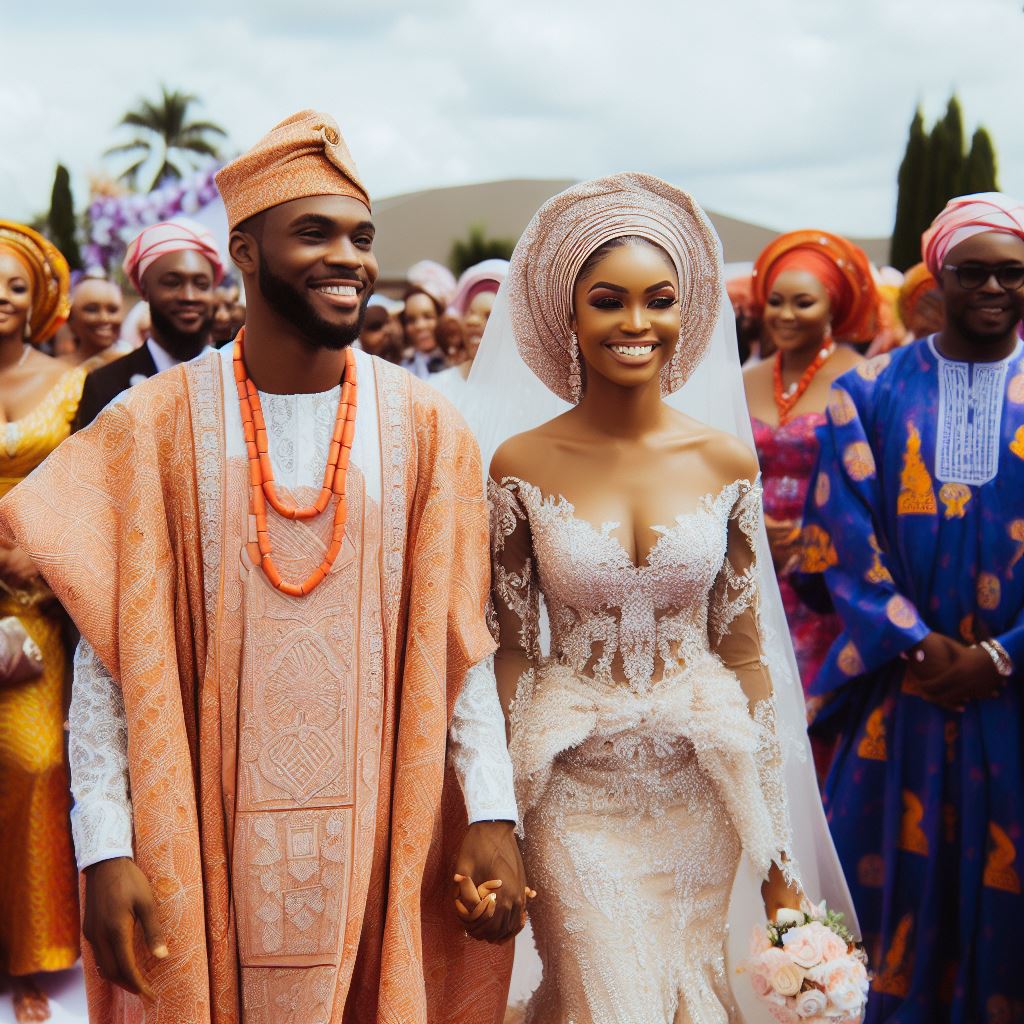
Role of Religion in Nigerian Marriages
Diverse religious practices
Religion plays a significant role in Nigerian marriages, shaping customs, traditions, and overall marital dynamics.
Christians, Muslims, and followers of traditional African religions comprise Nigeria’s richly diverse religious tapestry.
1. Christianity
Christianity, introduced by European missionaries during colonialism, has garnered a large following in Nigeria.
Many Nigerians identify as Christians and consider their faith as an integral part of their lives.
In Christian marriages, religious teachings and values heavily influence marital customs and practices.
Couples often undergo pre-marital counseling and engage in religious ceremonies to seek blessings and guidance for their union.
2. Islam
Islam, another prominent religion in Nigeria, shapes marriage customs and practices for Muslim couples.
Islamic teachings emphasize the importance of harmony and mutual respect within marriages.
Muslim weddings observe rituals like signing a marriage contract (nikah) and giving a dowry (mahr).
These practices are influenced by religious teachings and are considered essential for a valid and blessed union.
3. Traditional African religions
Apart from Christianity and Islam, traditional African religions continue to play a role in Nigerian marriages, particularly in rural areas.
Indigenous beliefs, cultural practices, and ancestral spirit worship deeply root these religions.
African marriage celebrations actively integrate traditional religious rituals, seeking ancestral blessings for a prosperous and fruitful union.
Influence of religion on marriage customs and practices
1. Religious ceremonies and rituals
Religious ceremonies and rituals hold immense significance in Nigerian marriages.
They represent a bonding of not just two individuals but also their families and the wider community.
These ceremonies vary depending on the religious affiliation of the couple, but they generally involve prayers, the exchange of vows, and the presence of religious leaders or officiants.
2. Importance of religious teachings in marriage
The teachings of religion have a profound influence on marital life in Nigeria.
Religious doctrines often emphasize the importance of love, faithfulness, respect, and commitment within a marriage.
Couples are encouraged to adhere to these values in order to build a strong and lasting bond.
Religious teachings also guide couples in navigating challenges that arise within marriages, such as conflict resolution and forgiveness.
The influence of religion on marriage customs and practices extends beyond the wedding ceremony itself.
It permeates various aspects of married life in Nigeria, including gender roles, family dynamics, and decision-making processes.
For instance, religious teachings may prescribe specific roles for husbands and wives, outlining their respective responsibilities and expectations.
These teachings can shape the division of labor within households and influence decision-making on issues such as child-rearing and financial matters.
In general, religion holds a powerful sway over Nigerian marriages.
Whether Christian, Muslim, or adherent of traditional African religions, couples in Nigeria incorporate religious practices, rituals, and teachings into their marriage customs.
This religious influence reinforces the importance of faith, commitment, and unity within marital relationships, helping couples navigate the challenges and joys of married life.
Read: Navigating Marital Challenges: Guidance from the Bible
Changing Dynamics of Marriage in Nigeria
Influence of Globalization and Modernization
- In Nigeria, traditional arranged marriages are evolving, reflecting global trends toward love-based unions.
- Urbanization and education are central to this shift, as they expose Nigerians to different lifestyles and ideas.
Transformations in Gender Roles and Expectations
- Women’s empowerment has a profound effect on marriage choices. Nigerian women are increasingly involved in the decision-making process.
- Emerging notions of gender equality are altering the dynamics of Nigerian marriages, promoting shared responsibilities.
Rise of Interethnic and Interreligious Marriages
- Mixed marriages are on the rise, though they come with challenges like cultural differences and prejudices.
- Despite these challenges, interethnic and interreligious marriages are changing social dynamics and fostering cultural integration.
Influence of Globalization and Modernization
Marriage in Nigeria is no longer just a word or ceremony; it has undergone significant transformations in recent years.
The influence of globalization and modernization has propelled Nigerians towards love-based marriages, diverging from traditional arranged unions.
Urbanization and education have played a pivotal role in this change, as they expose individuals to different lifestyles and diverse perspectives.
Transformations in Gender Roles and Expectations
Transformations in gender roles and expectations have redefined marital dynamics.
Women’s empowerment has granted them a more significant say in their marriage choices, and emerging notions of gender equality are promoting shared responsibilities within Nigerian households.
Rise of Interethnic and Interreligious Marriages
A noteworthy trend is the rise of interethnic and interreligious marriages.
While these unions come with challenges, such as navigating cultural differences and prejudices, they are reshaping social dynamics and promoting cultural integration.
In Nigeria, marriage has evolved beyond its traditional boundaries, reflecting the broader changes seen in today’s globalized and modern world.
Read: A Lifelong Bond: Inspirational Bible Verses on Marriage
Conclusion
In this post, we’ve delved into the vibrant tapestry of Nigerian marriages, a rich tradition that goes beyond mere words or ceremonies.
First, we explored the significance of the traditional marriage rites, showcasing how each ritual is a cultural treasure.
Next, we discovered the complexities of inter-tribal unions, emphasizing the role they play in fostering unity.
Moreover, we uncovered the economic aspects, proving that marriage is not just about love but also an intricate financial web.
Additionally, we discussed the dynamism of contemporary Nigerian marriages, demonstrating their adaptability in a changing world.
In a nutshell, it’s crucial to understand Nigerian marriage culture for a more profound appreciation of its depth.
In all, let us celebrate the richness and diversity of Nigerian marriages, respecting their values and traditions.
Nigerian marriages are more than words or ceremonies; they are a reflection of a nation’s heart and soul.

